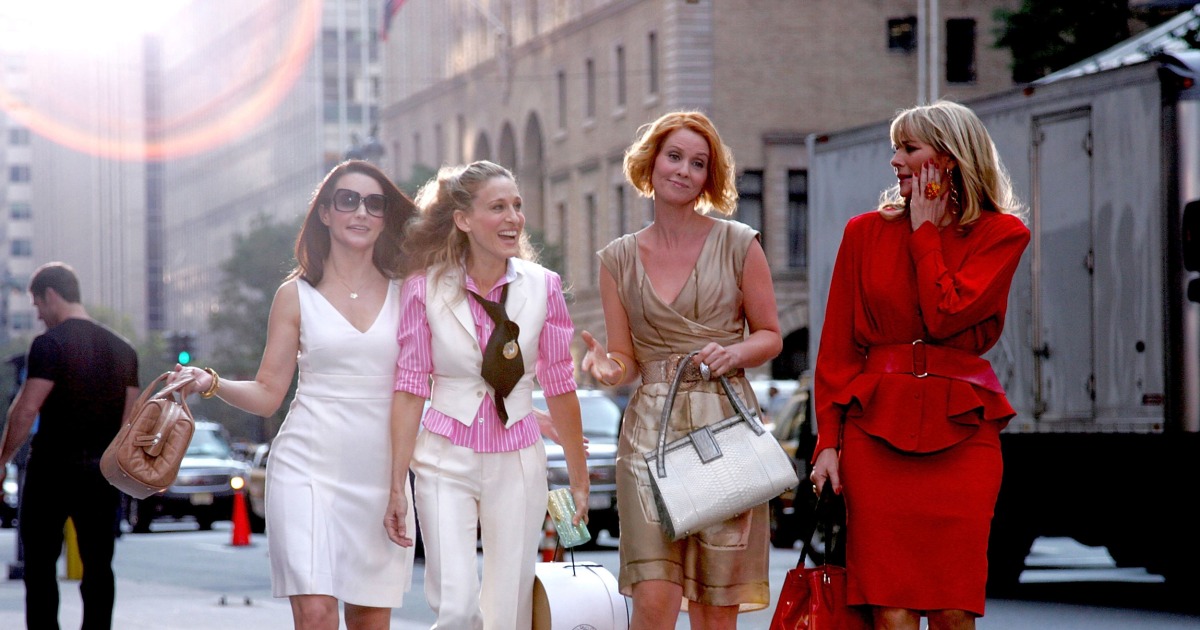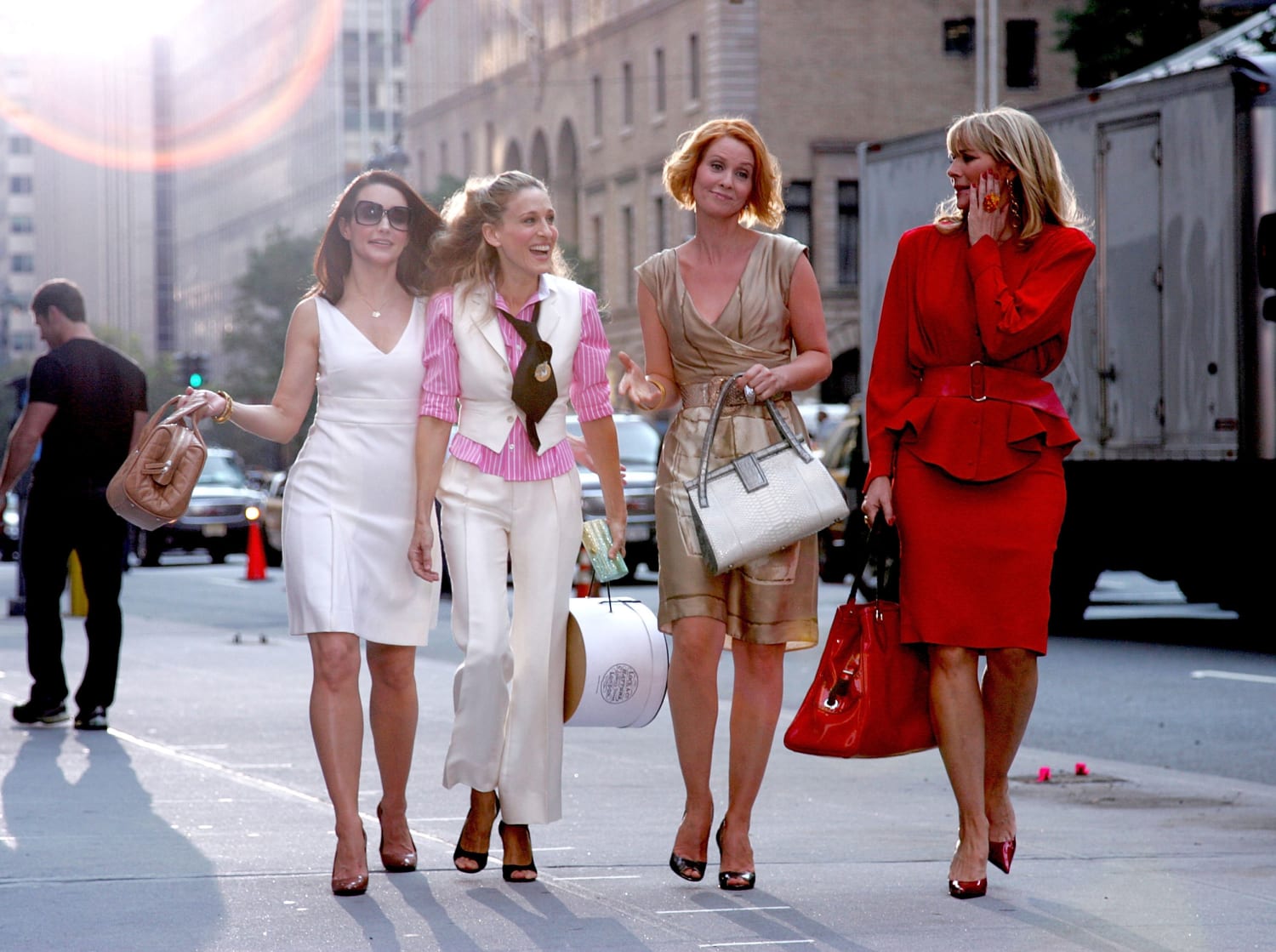
When the news came out that “Sex and the City” is getting a 10-episode revival on HBO Max without the character of Samantha Jones — apparently because Kim Cattrall has repeatedly made it clear that she will be available to revive her character on the first of never — the universe of potential viewers of a reboot split into two decided camps: the ones who realize Samantha Jones put all the good sex in “SATC” and everybody who still identifies as “a Carrie” and doesn’t think they are telling on themselves.
For a lot of viewers like me, Samantha’s sex-positive banter was the only reason to watch a show set in the whitest possible version of New York City. Aside from a fundamentally flawed understanding about the financial reality of being the writer of a single newspaper column living in Manhattan — Carrie couldn’t have afforded that apartment, never mind all those shoes and clothes; I will die on this hill — the show’s writers struggled to balance its theoretically feminist narrative with the increasing imperative to make its protagonist its sole heroine.
That’s because, for a show about single women over 30, their friendships and their sex lives, Samantha was the one only consistently honest with her partners (and herself) about her desires and her limits.
And — despite what was eventually written into the films and is considered about as canonical to the series as “Terminators” 3-5 — Samantha’s partner, Smith, remains one of the best men on the show. He was attractive, supportive even through her cancer and most of all respectful of her needs and desires at every turn.
Largely the other men the friends dated in the long term — let alone the ones they dated for only an episode or two — highlight great reasons to never date in New York.
The question for the reboot is whether it can still be “Sex and The City” if no one’s having sex because the kids won’t go to bed.
And yet, Carrie not only kept trying to find a long-term partner from the dreck that passed in and out of her life; she also kept pushing the others to do the same. Samantha was the only one who pursued sex — just sex — for its own sake and wound up with someone whom she liked on her terms and who liked her on her terms, as well.
Carrie’s incoherent approach to dating and relationships yielded a trove of advice that no one should follow if they wanted happiness with partners who would show up at the altar. Aiden — the man Carrie used and then cheated on with Big — is the only one who seemingly was worth a woman’s making any changes to her life. (He ended up OK; she ended up regretting that decision.)
But taking Carrie’s advice meant Miranda gave up her freedom, her apartment and her happiness for a man who ultimately couldn’t find fidelity with a map. Charlotte didn’t take Carrie’s advice the second time and found happiness with her (we’re meant to believe) short, ugly divorce lawyer — who also happened to be kind and funny and adored her. But, despite Charlotte’s best efforts, there was nothing particularly interesting about her life after kids — though it’s truly in question whether there was anything particularly interesting about her life before kids, either.
The question for the reboot is whether it can still be “Sex and the City” if no one’s having sex because the kids won’t go to bed. Goodness knows, without Samantha in it, there’s bound to be much less sex and many more judgmental monologues.
In its original incarnation, the show was largely lacking in material that made it worthy of a return to their universe with, truly, the exception of Samantha.
Worse yet for viewers is that Carrie’s story and those of her friends are fundamentally about white women’s extreme privilege in an economically stratified, racially segregated city.
Carrie reacted to a life setback — being dumped by Aiden for being repeatedly unfaithful after he’d helped her buy her apartment and the one next door and was renovating it with her — by whining about the financial success of her friends instead of taking real accountability for her bad decisions until one of them (Charlotte) bailed her out. Miranda (for some inexplicable reason) threw herself into co-parenting and then a marriage with Steve despite his myriad flaws — his inability to stay faithful being one — but she maintained a high-flying career in law without being relegated to the “mommy track” or dealing with any real child care concerns. Carrie’s career always took a back seat to her never-ending relationship dramas, but, because poverty is for other people — the ones we mostly don’t see in the show — it rarely had any effect on her.
In its original incarnation, the show was largely lacking in material that made it worthy of a return to their universe with, truly, the exception of Samantha — a self-made career woman who pursued sexual pleasure with both women and men that, even by today’s standards, would be pathbreaking; eschewed both marriage and the prospect of children; smoked weed; lacked body shame; and survived and thrived through, first, breast cancer and then menopause without giving in to social messaging that proclaims older women as unsexy or unsexual.
And that’s the character who’s not coming back for the over-50 version of “SATC.”
The show is fundamentally about white women’s extreme privilege in an economically stratified, racially segregated city.
So, what’s left? It’s apparently not going to be Samantha’s happily-ever-after (if such a thing exists); the obvious out for writers is to open the series with Samantha’s death — she did have breast cancer, after all — which wouldn’t exactly make for a fun or enjoyable watch. And even if her absence is explained away in some less depressing fashion, there is still the problem that the show relies on a framing of New York City as a predominantly white playground where only the occasional guest star is darker than a paper bag.
Mirroring Cynthia Nixon’s run for public office (and her loss) in Miranda wouldn’t be a must-see, unless the show deals meaningfully with gentrification — especially in Brooklyn, where she had moved at the end of the series. Charlotte, having married her Jewish divorce lawyer and raising Jewish kids, could perhaps meaningfully address the rising tide of anti-Semitism — but she’s more likely to show off some more carefully placed pieces of art as part of a nebulous fundraiser for millions affected by Covid-19. And how will Carrie write about the terrible hardships of being married to a rich white man — or will she simply have moved to publishing thinly fictionalized novels of life in the city that bear no resemblance to most people’s lives in the city?
Watching Carrie, Miranda and Charlotte (sans Samantha) engage with the events of 2021 — which would have to include race and racism — would be compelling only if they were going to be honest about how much privilege they enjoyed for years and how clueless they had been in their interactions with the world outside their carefully constructed bubble of wealth. But Samantha was usually the only one who was truly honest with herself and in her journey — and held the others to the hardest account. America has gone through an incredibly hard couple of years, and I can’t think of anything less comforting than a return to the same old whitewashed fantasies of big-city life.
Source: | This article originally belongs to Nbcnews.com









